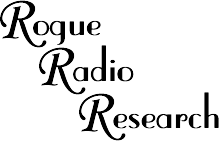We may be able to help. Contact us
| Return to the Rogue Radio Research Main Page |
Table of Contents
The Joint Statement on Micro Radio
Annotated Web Links
Links are grouped by category and internally indexed for easy searching.
Micro Radio Art Gallery
Cool micro radio art and graphics-hacks from around the web.
Visit Our Other Rogue Domain Sites

Micro Radio/Low Power FM
Rogue Radio Research is dedicated to the scholarly study of micro radio. This site contains original research on micro radio, general and specific guides, information, and annotated links to micro radio and related resources.
Non-profit Status
Non-Profit Status
There are three main reasons to get different non-profit status(stati? Well, you understand). The first is that only a non-profit (usually educational) can operate a non-commercial radio station under current FCC regulations and this would be a first step in preparing to participate in a new Low Power Radio Service (providing that happens). The second is that contributions to a non-profit can be tax deductible (like public radio pledges) which can encourage contributions. The third is that certain non-profits are tax exempt.
This can be a complicated process. There are several types of non-profit statuses . I plan to let the people who commented on it carry the load and I hope to have more information on this subject in the future. Several groups are pursuing this or have obtained this type(s) of status(es) for themselves. In general, if you are running an technically less than legal enterprise (broadcasting without a license), then this option will not be available to you. However, if say a Media Awareness Organization was formed and as part of its campaign gave money to a certain LPFM station, that would probably be okay. Incorporating into a non-profit restricts the activities you may engage in, so read the fine print. The LAST thing you want to do in bring the IRS down on your head. At any rate, find a lawyer or a helpful non-profit organization to walk you through it.
Types of Non-Profits
501c 4 and 501c 3
I took a class on 501c3 (THREE) lobbying to figure out where "the line" is,
and while I do not have my class notes on me at this moment, my memory says
that it is all right for a nonprofit tax-exempt educational institution to
"lobby" (they of course, don't call it that) if it can be considered
self-defense (lobbying for the Low Power Radio Service would be most likely
acceptable as defending conditions necessary to the organization's mission)
and if it is NOT demanding support or rejection of a specific legal BILL
before a LEGISLATURE. In other words, I believe that requesting public
support (but not a VOTE on LEGISLATION) for the LPRS from our congressmen and
Senators is OK. Also making comments and getting support for specific aspects
of the LPRS before NONELECTED bureaucrats on a REGULATORY issue (not
"legislation") is OK.
So once I realized that as far as I could tell, what I wanted to do with the
LPRS was acceptable "lobbying" for a 501c3 (THREE) ... I dropped my research
into the establishment of a lobbying organization or (alternately) a
Political Action Committee for the LPRS."
If anyone has a grasp of this process, I urge you to contact me or send me a url so I can better inform people on this subject. At any rate, stay tuned as there will be more information added here soon!
Creative Concepts for Funding your Micro Radio Station
Rogue Radio Research Main Page / Origins and Strategies / Capitalism v. Enterprise / Listener Support: On-air, Canvassing, and Tabling / Staff Funding / Sales: T-Shirts, Buttons, Bumper Stickers, and Whatnot / Concluding Comments.
"The way this has been explained to me is that 10% of funding for non-profits
comes from foundations, 5% from corporations, and 85% from private
individuals (members, DJs, neighbors, tee-shirt sales, etc.). That's the
stats from the non-profit world-at-large."
-Petunia Joan,Free Radio Memphis
"501c 4 is a nonprofit organization that is NOT TAX EXEMPT because it
carries out activities (lobbying) prohibited for Tax Exempt (usually
educational) organizations.
-Christopher Maxwell, WRFR (Radio Free Richmond, VA)